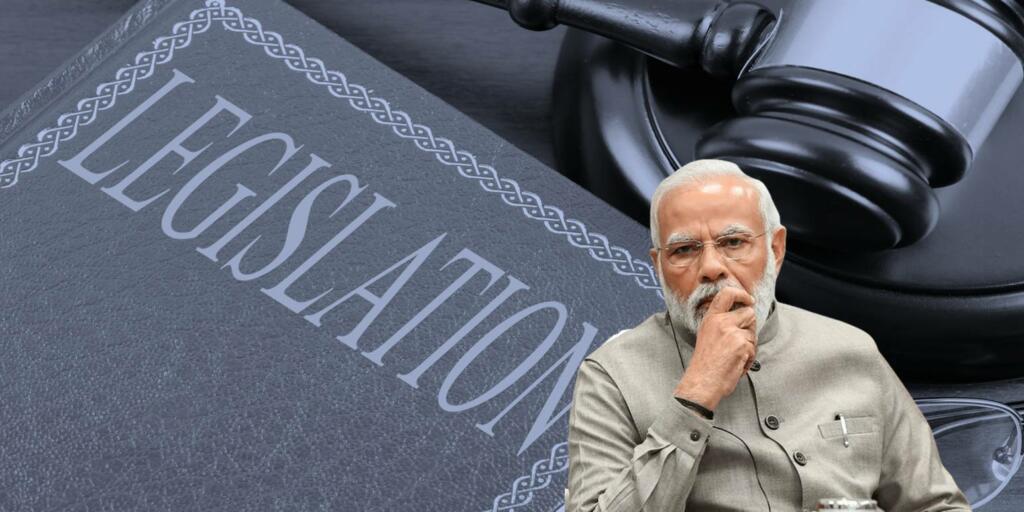The BJP government at the Centre has done a stupendous job when it comes to development and transformation of the country. However, one area where it has failed is to push through is legislative reforms. Almost everything leads to a protest from the CAA in 2019 to the Agnipath Scheme this year.
So, why the BJP has failed in pushing through legislation? Well, to put it succinctly, legislation has three steps- creation, communication and compliance. Modi government has failed in all three stages. This is effectively linked to the absence of a legal luminary at the helm of the Ministry of Law & Justice, and a tendency to buckle under pressure of orchestrated protests.
Issues with the creation of legislation
Recent memory will remind you of the Citizenship Amendment Act (CAA), farmer legislations and possibly the Agneepath Scheme when it comes to major protests. These were the more popular flashpoints between the Modi government and the anarchy spread by the left-liberal ecosystem.
However, the issue with creation of legislation dates back to the National Judicial Appointments Commission (NJAC) Act, 2014 which was held unconstitutional by the Supreme Court of India. The Act was supposed to set the process of judicial reforms in motion but it couldn’t survive the test of Constitutional validity. Since that, not much progress has been made in the direction of judicial reforms.
Recently, the Supreme Court also struck down a portion of the Constitutional Amendment that diluted the authority of States over cooperative societies. Whatever may be the intention of the government, the fact that its laws have got struck down shows that there have been issues with framing of legislations and ensuring that they remain within the broad scope and ambit of the Constitutional principles.
Issues with communication and compliance
Now, some good laws were also created. These laws like the Land Acquisition Bill of 2015 and the three farm laws enacted during the COVID-19 Pandemic had to be rolled back due to agitations, protests or unfair criticism within the Parliament. This is exactly where the issues of communication and compliance crop up.
Firstly, the Modi government had tried to push through the Land Acquisition Amendment Bill shortly after coming to power, in order to streamline the process of land acquisition for improving the business sentiment in the country and also ensuring that infrastructure development doesn’t lag behind.
However, the Bill was rolled back. Passing it with a minority in the Rajya Sabha proved to be an uphill task. However, the main issue was the propaganda about the Bill being regressive and the BJP’s inability to dispel such rumours through effective communication.
Again, we witnessed large-scale violence, rioting and arson during the CAA protests. This time around the Modi government wasn’t able to make it clear that the Act wasn’t exclusionary but an attempt to finally do justice to the persecuted minorities in Bangladesh, Pakistan and Afghanistan. Nor was the party able to ensure compliance by cracking down on anti-social elements.
And since we are talking of compliance, the discussion won’t be complete if we don’t talk about the farm laws. Despite the Supreme Court of India clarifying it in the context of Shaheen Bagh protests that the “right to protest cannot be any time and everywhere. There may be some spontaneous protests but in case of prolonged dissent or protest, there cannot be continued occupation of public place affecting rights of others,” the Centre failed to curb similar protests and blockages over farm laws. Ultimately, the farm laws had to be rolled back.
Read more: The striking similarities between Shaheen Bagh and Farmers’ protests
Need of legal luminaries
So, why is the BJP government failing to push through its legislative reforms? As we pointed out, some laws were not framed in the best of ways. This leaves a bad impression and suggests that the government should possibly consider someone like ex-CJI Ranjan Gogoi for the crucial post of Law Minister.
In his tenure as the Law Minister, Ravi Shankar Prasad didn’t seem very convincing in communicating the true substance of the many legislative actions that the Modi government tried to push through. His successor, Kiren Rijiju, is an efficient leader but cannot really be defined as a legal luminary.
The Modi government has therefore failed (creation, communication, compliance) on many issues from judicial reforms to agricultural reforms, and even land acquisition. Now, it is for the government to find out the root causes behind such lacunae. It may even consider appointing a panel of retired Supreme Court judges, High Court judges and Senior Advocates to frame laws that satisfy Constitutional limits and also remain workable without frequent Amendments.
At the same time, the Modi government must understand that the left-liberal ecosystem will protest no matter what. So, it needs to ensure compliance with such laws despite such protests. To be honest, you cannot keep your opponents happy and just because they are not happy, it doesn’t mean that the government should not implement laws which are passed in accordance with the country’s legislative system.
